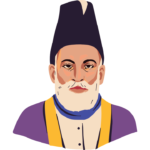Allama Muhammad Iqbal’s quotes on life hacking encourage self-empowerment and inner transformation. He emphasizes the importance of self-awareness and personal growth as key to unlocking true potential. Iqbal believes that life’s challenges can be overcome through determination, knowledge, and action. His philosophy inspires individuals to take control of their destiny and live with purpose, utilizing their abilities to shape a meaningful life.
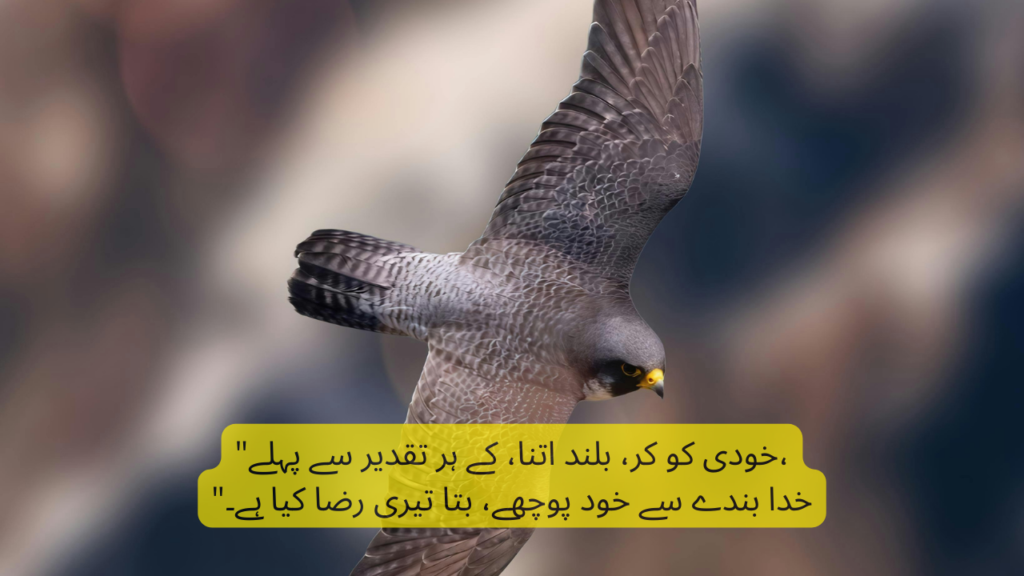
“خودی کو کر، بلند اتنا، کے ہر تقدیر سے پہلے،
خدا بندے سے خود پوچھے، بتا تیری رضا کیا ہے۔”
“Khudi ko kar, buland itna, ke har taqdeer se pehle,
Khuda bande se khud poochhe, bata teri raza kya hai.”
This verse by Allama Iqbal carries a profound message about self-empowerment and self-worth. In Urdu, it inspires individuals to elevate their character, strength, and inner self so high that they gain a sense of command over their destiny. Here, Iqbal speaks about “khudi” (selfhood or self-respect) and urges the listener to develop it to such an extent that they stand in harmony with divine will. When a person strengthens their character to this level, their aspirations align with the wisdom and higher purposes of the universe. Thus, Iqbal conveys that instead of being passively controlled by fate, one can reach a state where their will has a meaningful impact on their life, so much so that God, metaphorically, consults them in shaping their destiny.
یہ شعر علامہ اقبال کی طرف سے خودی اور خود اعتمادی کا ایک گہرا پیغام ہے۔ اس میں وہ انسان کو ترغیب دیتے ہیں کہ وہ اپنے کردار، قوت اور باطن کو اتنا بلند کر لے کہ وہ اپنی تقدیر پر گرفت حاصل کر سکے۔ یہاں اقبال “خودی” (یعنی خودی یا عزت نفس) کی بات کرتے ہیں اور سنتے کو اس درجے پر پہنچنے کی ترغیب دیتے ہیں کہ وہ خدا کی مرضی کے ساتھ ہم آہنگ ہو جائیں۔ جب ایک شخص اپنے کردار کو اس سطح تک مضبوط کر لیتا ہے تو اس کی خواہشات کائنات کے حکمت اور اعلیٰ مقاصد کے ساتھ ہم آہنگ ہو جاتی ہیں۔ اس طرح، اقبال یہ پیغام دیتے ہیں کہ بجائے اس کے کہ انسان قسمت کے ہاتھوں میں مجبور رہے، وہ اس سطح پر پہنچ سکتا ہے جہاں اس کی مرضی زندگی پر معنی خیز اثر ڈالتی ہے، یہاں تک کہ خدا، علامتی طور پر، اس کی تقدیر کے بارے میں اس سے مشورہ کرتا ہے۔
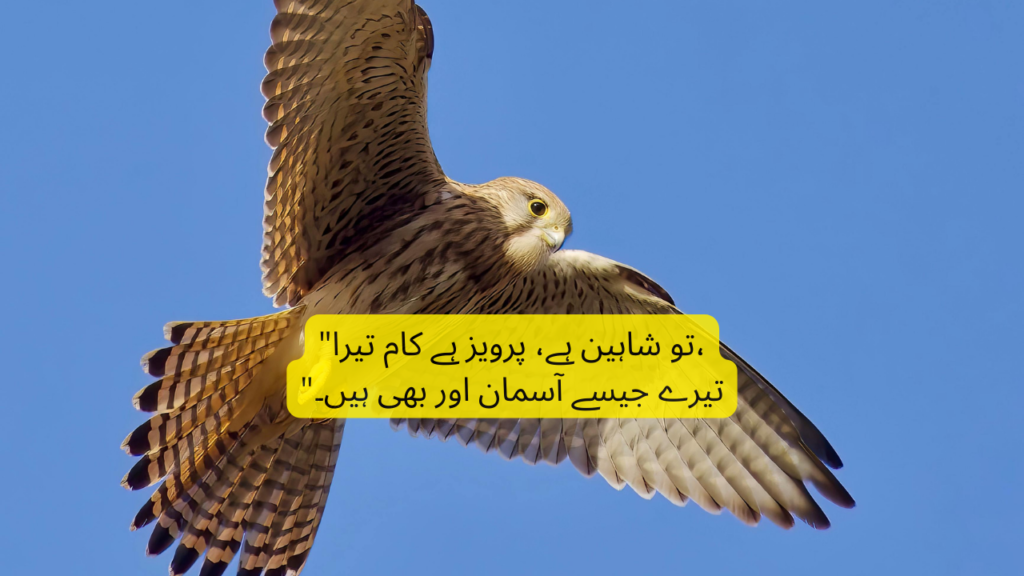
“تو شاہین ہے، پرویز ہے کام تیرا،
تیرے جیسے آسمان اور بھی ہیں۔”
“Tu shaheen hai, parwaz hai kaam tera,
Tere samne aasman aur bhi hain.”
In this verse, Allama Iqbal addresses the listener as a “shaheen” (falcon), symbolizing ambition, strength, and independence. Iqbal emphasizes that the true purpose of the listener, like the falcon, is to soar high, focusing on lofty goals rather than being content with mediocrity. He uses the metaphor of the “shaheen” to inspire self-reliance, courage, and resilience, urging the listener to embrace challenges without fear or dependency. The line “tere jaise aasmaan aur bhi hain” (there are skies beyond for you to conquer) implies that there are endless horizons and opportunities awaiting the individual. It encourages them to explore new heights, reach beyond limitations, and understand that their potential is vast. Iqbal’s message is one of continuous growth, urging people to push beyond conventional boundaries to achieve greatness.
اس شعر میں، علامہ اقبال مخاطب کو “شاہین” کہہ کر پکارتے ہیں، جو بلندی، قوت اور آزادی کی علامت ہے۔ اقبال زور دیتے ہیں کہ مخاطب کا حقیقی مقصد، شاہین کی طرح، بلند پرواز ہے، اور اسے اوسط درجے کی زندگی پر قناعت نہیں کرنی چاہیے۔ وہ “شاہین” کا استعارہ استعمال کرتے ہوئے خود اعتمادی، بہادری، اور استقامت کی ترغیب دیتے ہیں، اور سننے والے کو چیلنجز کا بے خوف اور بغیر انحصار کے سامنا کرنے کا درس دیتے ہیں۔ “تیرے جیسے آسمان اور بھی ہیں” کا مطلب یہ ہے کہ فرد کے لئے لا محدود افق اور مواقع موجود ہیں۔ یہ انہیں نئی بلندیوں کی تلاش، حدود سے آگے بڑھنے، اور اپنی بے پناہ صلاحیتوں کا ادراک کرنے کی ترغیب دیتا ہے۔ اقبال کا پیغام مسلسل ترقی کا ہے، جس میں وہ لوگوں کو روایت کی سرحدوں سے باہر نکل کر عظمت حاصل کرنے کی ترغیب دیتے ہیں۔
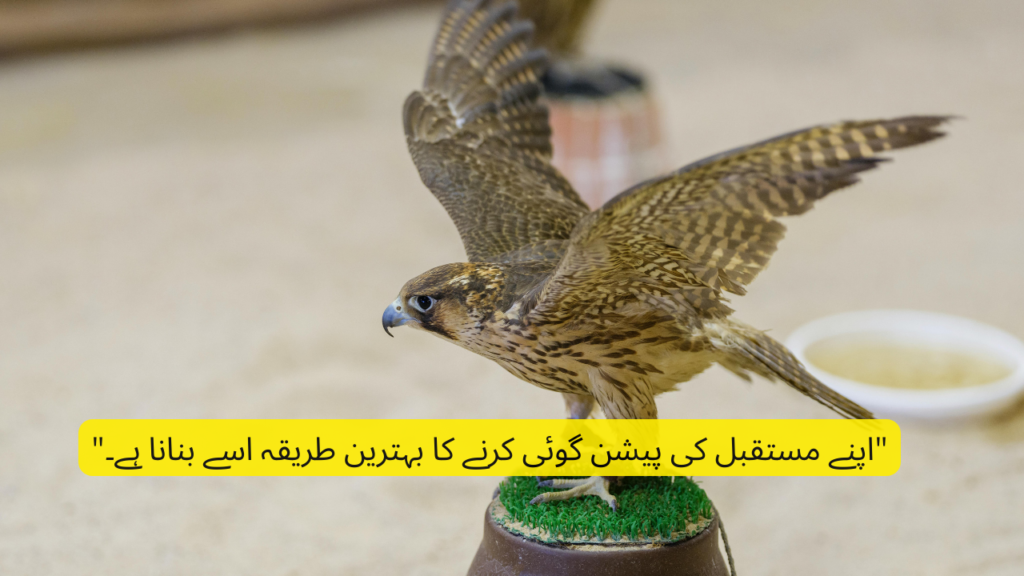
“اپنے مستقبل کی پیشن گوئی کرنے کا بہترین طریقہ اسے بنانا ہے۔”
“The best way to predict your future is to create it.”
“The best way to predict your future is to create it” emphasizes the power of personal agency in shaping one’s destiny. Rather than waiting for circumstances to unfold, this quote encourages taking proactive steps toward achieving desired outcomes. By setting clear goals, making intentional choices, and putting in consistent effort, individuals can build the future they envision. It suggests that our actions today directly influence our tomorrow, placing responsibility for our future in our own hands. This approach highlights the value of planning, resilience, and self-determination in achieving success. Rather than relying on luck or external factors, creating one’s future empowers people to turn dreams into reality through commitment and purposeful action. Ultimately, it’s a call to take control, define goals, and work steadily toward them.
“اپنے مستقبل کی پیش گوئی کرنے کا بہترین طریقہ یہ ہے کہ اسے خود تخلیق کیا جائے” ذاتی اختیار کی طاقت کو اجاگر کرتا ہے تاکہ انسان اپنے تقدیر کو خود شکل دے سکے۔ اس قول کا مقصد حالات کے خود بخود بدلنے کا انتظار کرنے کے بجائے اپنے مطلوبہ نتائج کے حصول کے لیے فعال اقدامات کرنا ہے۔ واضح مقاصد متعین کر کے، سوچ سمجھ کر فیصلے کر کے اور مسلسل محنت کر کے، انسان وہ مستقبل بنا سکتے ہیں جس کا وہ تصور کرتے ہیں۔ یہ بتاتا ہے کہ ہمارے آج کے اعمال کل پر براہ راست اثر ڈالتے ہیں، اور ہمارے مستقبل کی ذمہ داری ہمارے اپنے ہاتھ میں ہے۔ یہ طریقہ کار منصوبہ بندی، استقامت، اور خود مختاری کی اہمیت کو اجاگر کرتا ہے تاکہ کامیابی حاصل کی جا سکے۔ قسمت یا بیرونی عوامل پر انحصار کرنے کے بجائے، اپنا مستقبل تخلیق کرنا لوگوں کو اپنے خوابوں کو حقیقت میں بدلنے کے لیے عزم اور مقصد کے ساتھ کام کرنے کی طاقت دیتا ہے۔ آخرکار، یہ اپنے آپ پر قابو پانے، مقاصد کو واضح کرنے، اور ان کی طرف مسلسل محنت کرنے کا پیغام دیتا ہے۔
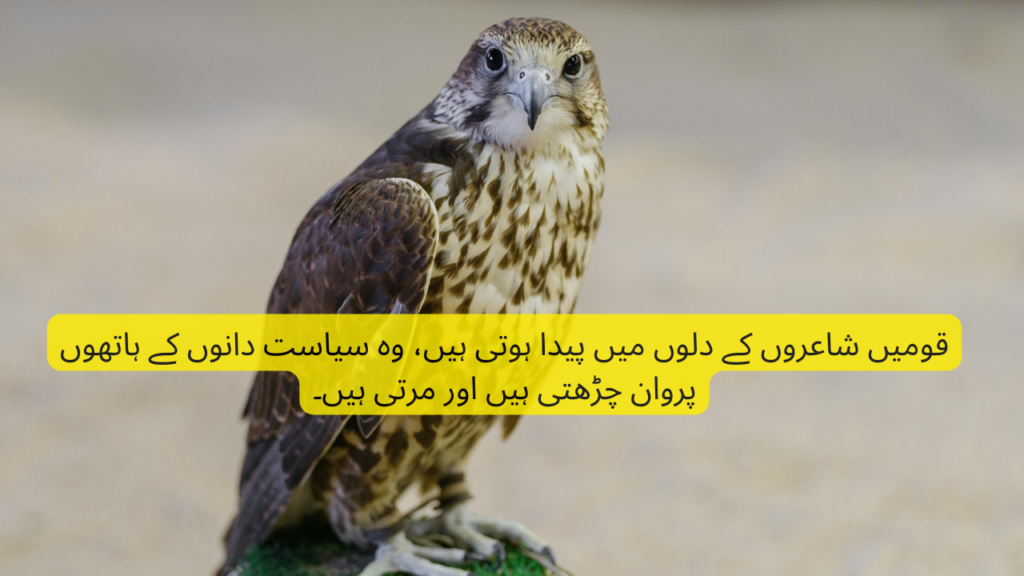
قومیں شاعروں کے دلوں میں پیدا ہوتی ہیں، وہ سیاست دانوں کے ہاتھوں پروان چڑھتی ہیں اور مرتی ہیں۔
“Nations are born in the hearts of poets, they prosper and die in the hands of politicians.”
This quote highlights the vital role poets play in the formation and vision of a nation. Poets, with their powerful words, spark the imagination, dreams, and collective consciousness of a people, planting the seeds of a nation’s birth. They inspire hope, unity, and pride through their verses, fostering a sense of identity and purpose. However, the future of that nation is shaped by politicians, whose decisions and actions determine its direction. While poets lay the foundation, it is politicians who wield the power to either nurture or destroy what has been built. This statement implies that the prosperity of a nation depends not only on the ideals and aspirations set forth by poets but also on the governance and leadership provided by politicians. Ultimately, the success or failure of a nation is influenced by the combination of vision and leadership.
یہ قول اس بات کو اجاگر کرتا ہے کہ شاعروں کا ایک قوم کی تشکیل اور وژن میں کیا اہم کردار ہوتا ہے۔ شاعروں کی طاقتور شاعری لوگوں کی تخیل، خوابوں اور اجتماعی شعور کو جلا دیتی ہے، اور قوم کی پیدائش کے بیج بوتی ہے۔ وہ اپنے اشعار کے ذریعے امید، اتحاد اور فخر پیدا کرتے ہیں، اور قوم کے لیے ایک شناخت اور مقصد کا شعور دیتے ہیں۔ تاہم، قوم کا مستقبل سیاست دانوں کے ہاتھوں میں ہوتا ہے، جن کے فیصلے اور اقدامات اس کی سمت کا تعین کرتے ہیں۔ جہاں شاعری بنیاد رکھتی ہے، وہاں سیاست دان اس طاقت کو رکھتے ہیں کہ وہ بنائی گئی چیز کو یا تو پروان چڑھائیں یا تباہ کر دیں۔ یہ بیان اس بات کی طرف اشارہ کرتا ہے کہ کسی قوم کی خوشحالی نہ صرف شاعروں کے مثالی نظریات اور امنگوں پر منحصر ہے بلکہ سیاست دانوں کی حکمرانی اور قیادت پر بھی منحصر ہے۔ آخرکار، کسی قوم کی کامیابی یا ناکامی، وژن اور قیادت کے امتزاج سے متاثر ہوتی ہے۔

“میں نبی نہیں ہوں، بلکہ سچائی کا عاشق ہوں۔ اور سچائی، جیسا کہ میں سمجھ آیا ہوں، ہیرے کی مانند ہے۔”
“I am not a prophet, but a lover of truth. And truth, as I have come to understand it, is like a diamond.”
This quote expresses a deep commitment to truth and the pursuit of knowledge. The speaker humbly denies being a prophet, positioning themselves not as a bearer of divine revelation, but as someone who values truth above all. By comparing truth to a diamond, the speaker emphasizes its rarity, clarity, and brilliance. Just as a diamond is precious and can withstand the test of time, truth is enduring and unbreakable. The speaker suggests that truth may not always be easily understood or accessible, but its value and beauty are undeniable. Like a diamond, truth often requires effort and discernment to uncover. This quote reflects a philosophical belief that truth, when found, shines with an unparalleled brilliance. It encourages seeking truth with devotion and humility.
یہ اقتباس سچائی اور علم کے حصول سے گہری وابستگی کا اظہار کرتا ہے۔ مقرر عاجزی سے نبی ہونے سے انکار کرتا ہے اور اپنے آپ کو الہامی وحی کا حامل نہیں سمجھتا، بلکہ سچائی کو سب سے بڑھ کر اہمیت دیتا ہے۔ سچائی کو ہیرے سے تشبیہ دے کر مقرر اس کی نایابی، وضاحت اور چمک کو نمایاں کرتا ہے۔ جس طرح ہیرا قیمتی ہوتا ہے اور وقت کے امتحان میں کھرا اترتا ہے، اسی طرح سچائی پائیدار اور ناقابلِ شکست ہوتی ہے۔ مقرر کا کہنا ہے کہ سچائی ہمیشہ سمجھنے میں آسان یا حاصل کرنے میں آسان نہیں ہوتی، لیکن اس کی قدر اور خوبصورتی ناقابلِ تردید ہیں۔ جیسے ہیرا، سچائی بھی اکثر محنت اور شعور سے سامنے آتی ہے۔ یہ اقتباس ایک فلسفیانہ اعتقاد کی عکاسی کرتا ہے کہ سچائی، جب ملتی ہے، تو بے مثال چمک کے ساتھ روشن ہوتی ہے۔ یہ سچائی کی جستجو کو لگن اور عاجزی کے ساتھ جاری رکھنے کی ترغیب دیتا ہے۔
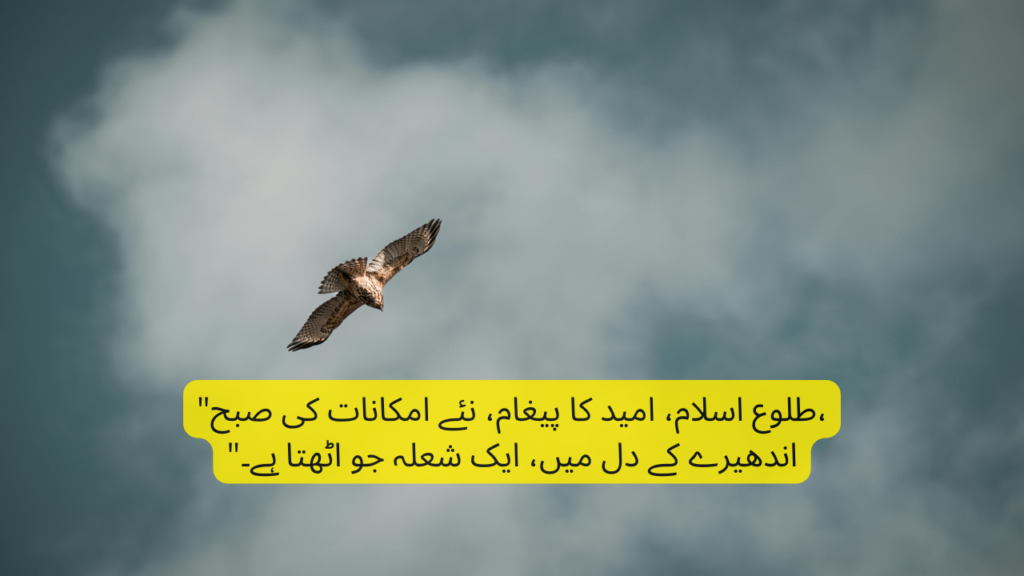
“طلوع اسلام، امید کا پیغام، نئے امکانات کی صبح،
اندھیرے کے دل میں، ایک شعلہ جو اٹھتا ہے۔”
“Tulu-e-Islam, a message of hope, a dawn of new possibilities,
In the heart of darkness, a flame that rises.”
“Tulu-e-Islam” symbolizes a new beginning and the emergence of hope, like the rising of the sun after a long night. It embodies the promise of renewal, illuminating paths previously hidden in the shadows. In times of hardship, it brings light, casting away despair and unveiling fresh opportunities. This phrase represents a call for awakening and enlightenment, urging people to seek knowledge and embrace progress. It speaks to resilience in the face of adversity, suggesting that even in the darkest moments, there is potential for growth and transformation. The imagery of a rising flame signifies inner strength, igniting a spirit of unity and purpose.
“Tulu-e-Islam” ایک نئے آغاز اور امید کے ابھرنے کی علامت ہے، جیسے ایک طویل رات کے بعد سورج کا طلوع ہونا۔ یہ تجدید کا وعدہ کرتا ہے اور ان راستوں کو روشن کرتا ہے جو پہلے اندھیروں میں چھپے ہوئے تھے۔ مشکلات کے وقت میں یہ روشنی لاتا ہے، مایوسی کو دور کرتا ہے اور نئے مواقع کو اجاگر کرتا ہے۔ یہ فقرہ بیداری اور روشنی کی جانب ایک پکار کی نمائندگی کرتا ہے، لوگوں کو علم حاصل کرنے اور ترقی کو گلے لگانے کی ترغیب دیتا ہے۔ یہ مصیبتوں کے مقابلے میں عزم و حوصلے کی بات کرتا ہے، اس بات کو اجاگر کرتا ہے کہ تاریک ترین لمحات میں بھی بڑھنے اور تبدیلی کی صلاحیت موجود ہوتی ہے۔ ایک اٹھتی ہوئی شعلے کی تصویر اندورنی طاقت کی نشاندہی کرتی ہے، جو اتحاد اور مقصد کا جذبہ روشن کرتی ہے۔

“لوگوں کو تباہ کرنے کا سب سے مؤثر طریقہ یہ ہے کہ ان کی تاریخ کے بارے میں ان کی اپنی سمجھ کو جھٹلایا جائے”۔
“The most effective way to destroy people is to deny and obliterate their own understanding of their history.”
This quote highlights the power of historical identity and its role in shaping a community’s strength and sense of self. By erasing or distorting a people’s history, oppressors can weaken their unity and control their future. History provides context, values, and pride; without it, people can lose their direction and identity. Denying a group’s understanding of its past creates confusion, making it harder for them to resist manipulation. This tactic not only erodes cultural heritage but also disrupts the continuity of values passed down through generations. Without historical roots, people may struggle to find purpose, making them more vulnerable to influence. Ultimately, understanding one’s history is key to resilience and self-empowerment.
یہ قول تاریخی شناخت کی طاقت اور اس کے معاشرتی طاقت اور خودی کی تشکیل میں کردار کو اجاگر کرتا ہے۔ کسی قوم کی تاریخ کو مٹانا یا بگاڑنا ان کے اتحاد کو کمزور کرنے اور ان کے مستقبل پر قابو پانے کا ایک ذریعہ بن سکتا ہے۔ تاریخ ہمیں تناظر، اقدار اور فخر فراہم کرتی ہے؛ اس کے بغیر لوگ اپنا راستہ اور شناخت کھو سکتے ہیں۔ ایک گروہ کو اس کے ماضی کی سمجھ سے محروم کرنا الجھن پیدا کرتا ہے اور انہیں استحصال سے بچنے میں مشکل پیش آتی ہے۔ یہ حکمت عملی نہ صرف ثقافتی ورثے کو مٹاتی ہے بلکہ نسل در نسل منتقل ہونے والی اقدار کے تسلسل کو بھی متاثر کرتی ہے۔ بغیر تاریخی جڑوں کے لوگ اپنے مقصد کی تلاش میں مشکل محسوس کر سکتے ہیں، جس سے ان کا اثر قبول کرنے کا امکان بڑھ جاتا ہے۔ آخر کار، اپنے ماضی کی سمجھ بوجھ میں مضبوطی اور خودمختاری کا راز چھپا ہے۔
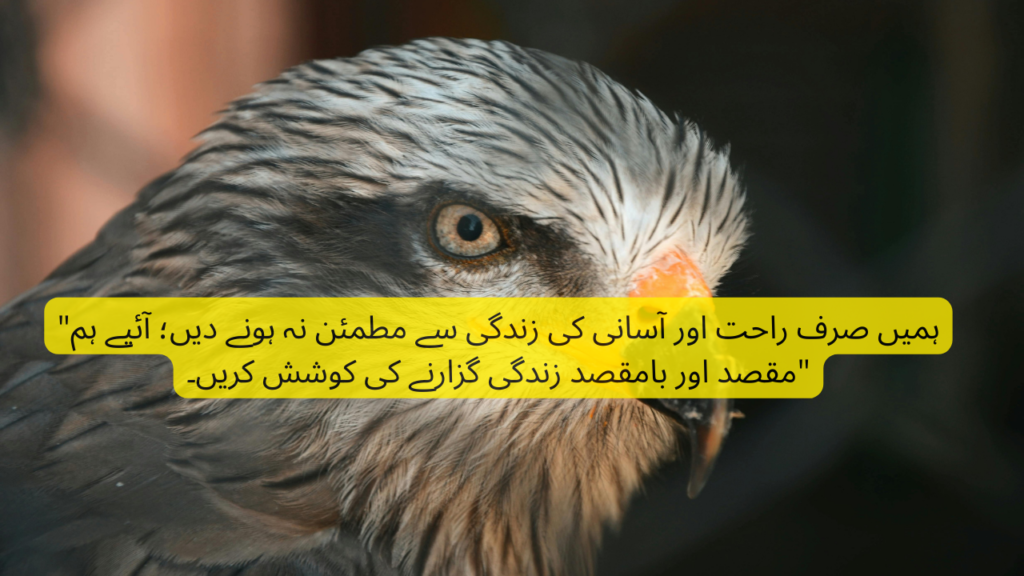
“ہمیں صرف راحت اور آسانی کی زندگی سے مطمئن نہ ہونے دیں؛ آئیے ہم مقصد اور بامقصد زندگی گزارنے کی کوشش کریں۔”
“Let us not be satisfied with just a life of comfort and ease; let us strive to live a life of purpose and meaning.”
This quote encourages us to look beyond mere comfort and seek a deeper sense of fulfillment in life. Living solely for ease can lead to complacency, leaving potential unrealized. A purposeful life, however, challenges us to pursue goals that bring value to ourselves and others. True meaning often comes from dedication, growth, and the impact we make. When we strive for purpose, we connect with our strengths, discover passions, and find satisfaction beyond material gains. This mindset fosters resilience and motivation, guiding us through challenges with a sense of direction. Ultimately, a life of purpose enriches both our own lives and those of others, leaving a lasting legacy.
یہ قول ہمیں محض آرام و سکون سے آگے دیکھنے اور زندگی میں گہرا اطمینان حاصل کرنے کی ترغیب دیتا ہے۔ صرف آسانی کی زندگی گزارنا ہمیں خود پسندی کی طرف لے جا سکتا ہے اور ہماری صلاحیتیں سامنے نہیں آ پاتیں۔ مقصدیت سے بھرپور زندگی ہمیں ایسے اہداف کے حصول کی طرف مائل کرتی ہے جو ہمیں اور دوسروں کو فائدہ پہنچاتے ہیں۔ حقیقی معنویت اکثر محنت، ترقی، اور ہمارے کام کے اثر سے حاصل ہوتی ہے۔ جب ہم مقصد کی تلاش کرتے ہیں تو اپنی طاقتوں سے جڑ جاتے ہیں، اپنے شوق دریافت کرتے ہیں اور مادی فائدوں سے ہٹ کر اطمینان محسوس کرتے ہیں۔ یہ طرزِ فکر مشکلات میں بھی حوصلہ اور عزم فراہم کرتا ہے اور ایک سمت عطا کرتا ہے۔ آخر کار، ایک بامقصد زندگی نہ صرف ہماری بلکہ دوسروں کی زندگیوں کو بھی مالا مال کرتی ہے اور ایک دیرپا میراث چھوڑ جاتی ہے۔
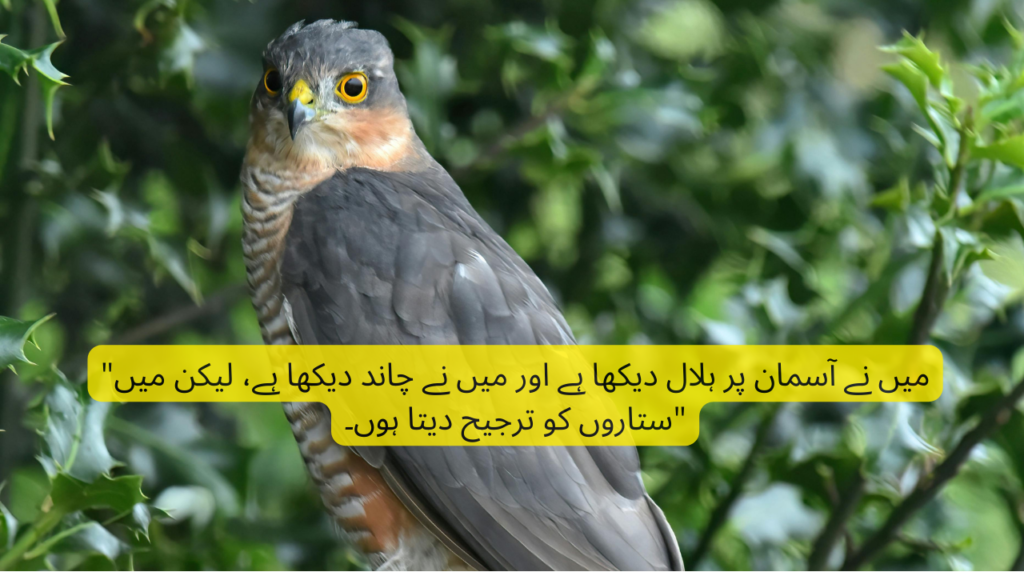
“میں نے آسمان پر ہلال دیکھا ہے اور میں نے چاند دیکھا ہے، لیکن میں ستاروں کو ترجیح دیتا ہوں۔”
“I have seen the crescent in the sky and I have seen the moon, but I prefer the stars.”
This quote expresses a preference for subtle beauty and the allure of what is often overlooked. The crescent and the moon, while beautiful and captivating, are also obvious and bold in the night sky. The stars, however, are quieter, more scattered, and may go unnoticed by some. Choosing the stars symbolizes valuing the understated and the unique qualities that might be missed at first glance. It suggests a desire for diversity, depth, and a connection with what feels infinite and profound. Unlike the singular moon, stars represent multiplicity and wonder, encouraging us to appreciate the vastness around us. This preference reflects a love for exploration, curiosity, and finding beauty in the less apparent.
یہ قول خاموش حسن اور اس کشش کی ترجمانی کرتا ہے جو اکثر نظر انداز ہو جاتی ہے۔ ہلال اور چاند، اگرچہ خوبصورت اور دلکش ہیں، مگر رات کے آسمان میں نمایاں اور واضح ہیں۔ ستارے، دوسری طرف، خاموش، بکھرے ہوئے ہوتے ہیں اور بعض اوقات کسی کی نظر میں نہیں آتے۔ ستاروں کو منتخب کرنا اس بات کی علامت ہے کہ پوشیدہ اور منفرد خصوصیات کی قدر کی جائے جو پہلی نظر میں محسوس نہیں ہوتیں۔ یہ تنوع، گہرائی اور اس لا محدودیت کی خواہش کو ظاہر کرتا ہے جو عمیق محسوس ہوتی ہے۔ چاند کی یکسانیت کے برعکس، ستارے کثرت اور حیرت کی نمائندگی کرتے ہیں اور ہمیں اپنے ارد گرد کی وسعت کی قدر کرنے کا درس دیتے ہیں۔ یہ ترجیح دریافت، تجسس اور غیر واضح حسن کی تلاش کے شوق کو ظاہر کرتی ہے۔
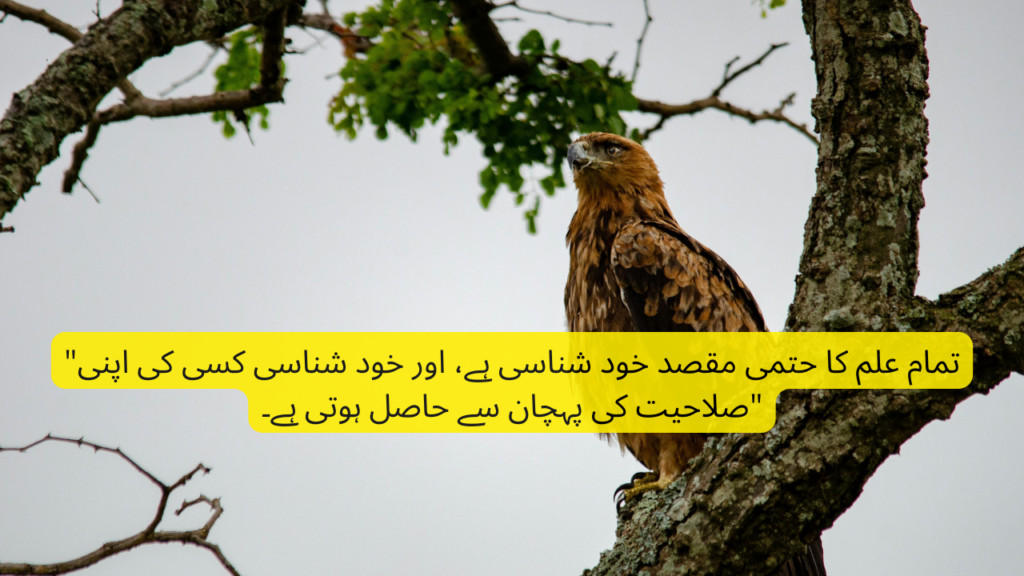
“تمام علم کا حتمی مقصد خود شناسی ہے، اور خود شناسی کسی کی اپنی صلاحیت کی پہچان سے حاصل ہوتی ہے۔”
“The ultimate goal of all knowledge is self-realization, and self-realization comes from the recognition of one’s own potential.”
This quote emphasizes that the highest purpose of gaining knowledge is to reach a true understanding of oneself, known as self-realization. Knowledge, in its deepest sense, is not merely about external facts or skills but about discovering one’s inner strengths and possibilities. Self-realization involves recognizing and embracing one’s unique potential, leading to a profound sense of purpose and identity. Through self-awareness, knowledge transforms into wisdom, guiding us towards personal growth and fulfillment. This journey of understanding oneself can inspire confidence and resilience, allowing us to use our abilities meaningfully. Ultimately, true knowledge connects us with our essence, revealing our role in the larger world and deepening our sense of belonging and contribution.
یہ قول اس بات پر زور دیتا ہے کہ علم کا سب سے اعلیٰ مقصد خود کی حقیقت کو پہچاننا ہے، جسے خود شناسی کہا جاتا ہے۔ علم کا گہرا مفہوم صرف خارجی حقائق یا مہارتوں تک محدود نہیں ہوتا، بلکہ یہ انسان کی اندرونی طاقتوں اور امکانات کو دریافت کرنے کا عمل ہے۔ خود شناسی میں اپنے منفرد امکانات کو پہچاننا اور اپنانا شامل ہے، جو ایک گہری مقصدیت اور شناخت کا باعث بنتا ہے۔ خود آگاہی کے ذریعے علم حکمت میں بدل جاتا ہے، جو ذاتی ترقی اور تکمیل کی طرف رہنمائی کرتا ہے۔ خود کو سمجھنے کا یہ سفر اعتماد اور لچک پیدا کرسکتا ہے، اور ہمیں اپنی صلاحیتوں کو بامقصد طریقے سے استعمال کرنے کی اجازت دیتا ہے۔ آخرکار، سچا علم ہمیں اپنی حقیقت سے جوڑتا ہے، دنیا میں اپنے کردار کو ظاہر کرتا ہے اور ہماری وابستگی اور شراکت کے احساس کو گہرا کرتا ہے۔


